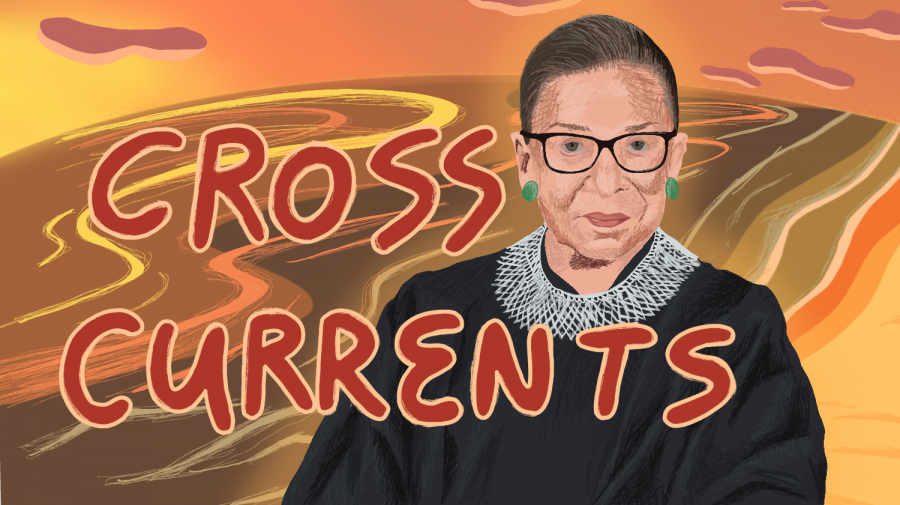The passing of Justice Ruth Bader Ginsburg has created a rift in the lives of many Americans during one of the most pressing political times in this country. Republicans are scrambling to fill that void with a Conservative nominee — which seems to be Federal Judge Amy Coney Barrett — while Democrats are wanting to honor Ginsburg’s wish to wait until after the general election to appoint a new judge. For this week’s Cross Currents, staff writers present arguments for both sides of this controversial issue.
 Eric Evelhoch, Staff Writer
Eric Evelhoch, Staff Writer
Just because you can doesn’t mean you should.
Make no mistake — Mitch McConnell’s 16 years of Senate Republican leadership have shown that if he can, he will confirm Amy Coney Barrett to the Supreme Court no matter the ramifications.
However, there is just one reason as to why I’d prefer the winner of the general election to determine who fills the vacant seat left by the passing of Justice Ruth Bader Ginsburg.
This reason is found in the election of 2000. Vice President Al Gore won the national popular vote over then Governor George W. Bush, but lost the election due to a Supreme Court decision along ideological lines to settle the disputed but certified vote count in the state of Florida.
Despite the historic uniqueness of this event, President Donald Trump has already said he expects the Supreme Court to have a say in the 2020 election.
Considering Trump’s tendency to tie up business issues in court for as long as possible, as well as efforts to hide his tax returns through litigation, it shouldn’t be a surprise that he’s prepared to question the election’s legitimacy at the Supreme Court.
Furthermore, Trump has been calling the results of the presidential election into question for months already, and beyond that he has yet to commit to a peaceful transition of power should he lose the election.
Never mind that instances of voter fraud are extremely rare, and the most recent large example of mail vote fraud occurred in a 2018 North Carolina election and favored a Republican.
Democratic party presidential candidates have received the majority of the popular vote in six of the last seven elections. In the 2016 election President Trump won with The Electoral College despite receiving nearly 2.1% fewer of the popular vote — the third lowest percentage ever, and lowest since 1876.
The idea of the 2020 election brought before the Supreme Court, with Barrett ruling in favor of a candidate who again significantly lost the popular vote, is a nightmare scenario.
I expect nothing more than crass political opportunism. I hope it doesn’t result in an event that could destroy the belief in the American democratic experiment.
 Jacob Frank, Opinion Editor
Jacob Frank, Opinion Editor
The fact is: They can, and there isn’t a significant reason why they shouldn’t.
That doesn’t mean there aren’t plenty of reasons why it’s disturbing.
According to the Constitution, the president nominates Supreme Court justices; and with the advice and consent of the Senate, they may be appointed.
With the Senate consisting of 53 Republicans to 47 Democrats, the GOP technically has the advice and consent of the Senate. These words are open for interpretation, but the general consensus is that a senate majority is sufficient.
Only two Republicans are expected to vote “no” against appointing Federal Judge Amy Coney Barrett before the election — Senators Susan Collins and Lisa Murkowski.
This still leaves the majority in favor of the Republicans.
A chief argument from the GOP is that this is what they are supposed to do. They have a majority in the House, a same-party president and an obligation to fill the role as it is necessary.
Democrats who oppose share the same ideology as the late Justice Ruth Bader Ginsburg right before she passed. Her famous final statement was that she wished the seat to remain vacant until after the election.
But is it really appropriate to hold such reverence for Ginsburg’s wish? What does that mean for our government?
It is true that in 2016 Majority Leader Mitch McConnell had refused to consider President Barack Obama’s nominee in February of that election year. But even Ginsburg told the New York Times that it is the job of the senators to consider it.
I believe this is the stark reality of the political game our country ascribes to. Everyone changes their viewpoints at some point or another.
Pointing out the position McConnell defended four years ago is not enough to justify as to why it is too close to the election to think about filling the court’s vacancy.
Unfortunately, despite public opinion, the appointment of a future judge that will impact the lives of every American rests in the hands of a few senators.
Every concern raised against this decision is a reality worth listening to, but it is part of a larger issue of preserving and improving the democratic system where it is apparently failing.
The strongest line of defense for citizens is to be conscious of local elections and appoint senators who will represent their voices in electing federal judges for lifelong terms in the future.









